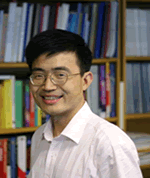 |
New York UniversityWebsite: http://eeweb.poly.edu/faculty/jiang/Email: |
Zhong-Ping JIANG (M’94, SM’02, F’08) received the B.Sc. degree in mathematics from the University of Wuhan, Wuhan, China, in 1988, the M.Sc. degree in statistics from the Universite de Paris-sud, France, in 1989, and the Ph.D. degree in automatic control and mathematics from the Ecole des Mines de Paris, France, in 1993.
Currently he is a Professor of Electrical and Computer Engineering at the Polytechnic Institute of New York University (formerly called Polytechnic University). His main research interests include stability theory, the theory of robust and adaptive nonlinear control, and their applications to underactuated mechanical systems, congestion control, wireless networks, multi-agent systems and Systems Physiology.
Dr. Jiang has served as a Subject Editor for the International Journal of Robust and Nonlinear Control, and as an Associate Editor for Systems & Control Letters, IEEE Transactions on Automatic Control and European Journal of Control. Dr. Jiang is a recipient of the prestigious Queen Elizabeth II Fellowship Award from the Australian Research Council, the CAREER Award from the U.S. National Science Foundation, and the Young Investigator Award from the NSF of China. He (together with coauthor Yuan Wang) received the Best Theoretic Paper Award at the 2008 World Congress on Intelligent Control and Automation, June 2008, for the paper “A Generalization of the Nonlinear Small-Gain Theorem for Large-Scale Complex Systems”.
Dr. Jiang is a Fellow of the IEEE and a Cheung Kong Professor at Beijing University.
Opportunities and Challenges in Applied Nonlinear Control
Significant progress has been made in the field of nonlinear control at
both levels of theory and practice. In this talk, we will look at
a practically important class of nonlinear systems, known as underactuated
mechanical systems, arising from control applications involving space,
ground and marine vehicles. These mechanical systems are underactuated
because of having less number of controls than the degrees of freedom.
Despite their clear importance in civil and military applications,
how to control them has posed serious challenges to the control
systems community. Indeed, a great deal of attention has been devoted
to the development of fundamentally nonlinear approaches and techniques
for feedback stabilization, trajectory tracking and more recently
formation and cooperative control.
One of the objectives of this talk is to revisit the stabilization and
tracking problem for underactuated mechanical systems, and
identify new opportunities for the further development of nonlinear
control theory. Some open control design problems will be given in the
talk.